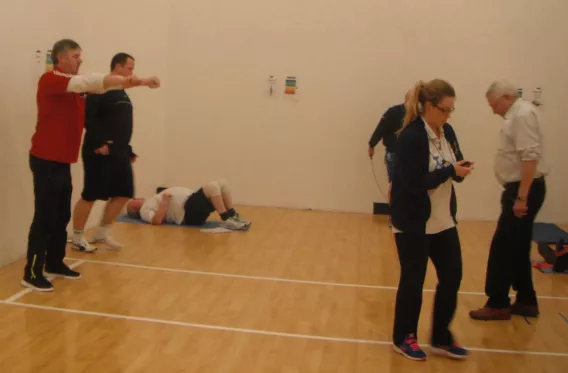Project
We work with a variety of community groups, identifying a health related need and provide education and exercise sessions to these groups in various locations. Groups include men’s sheds, primary schools, afterschool’s clubs (Bernardos) Active retirement groups and voluntary groups such as Stroke Support.
The aims of community project based placements are to • Provide a unique opportunity for final year students to plan and implement a health promotion programme as identified in the Healthy Ireland strategy. • To foster graduate attributes in our students such as creativity and leadership innovation? • To provide a sustainable and effective service to community groups
UL Access Campus (Donal O’Leary) Primary Schools in Limerick City Disability groups (Parkinsons association, Stroke support group) Afterschool’s clubs Irish World Academy of music and Dance Southill Area Resource Centre
Each placement is evaluated using the Clinical Education Quality Audit Form. Community facilitators including service providers and key workers provide formal and informal feedback through programme evaluation meetings and discussion with the project leader. Students who have completed this placement have provided very positive feedback on the experience. Additionally students have gained employment opportunities on graduation accredited to the skills that they have gained on this experience. A separate research project has been initiated to investigate the experience of students and service users who have participated in this placement model.
Research
The aim of this study is to explore the experiences of community group facilitators & service users who participated with non-traditional physiotherapy student placements. The objectives are: To investigate the organisation and delivery of the placement experience from the service users and community facilitators perspectives. To investigate the perceived outcomes from the service users and community facilitators perspective.
Lack of tradition is a barrier for physiotherapy students to participate in placements in community settings (McMahon et. al.). Furthermore, placement models that have a non-traditional supervisory structure such as role emerging or project placements are not commonly used in physiotherapy (Stainsby & Bannigan, 2012). In order to show the value of using different models of placement delivery the feedback from all stakeholders is required. To date studies have focused on the learning experience of the student on these placements (Dancza et. al, 2013 Adams et. al, 2013). The value of these placements to the service users and of community group leaders and facilitators needs to be considered
The nature of qualitative research is to explore individual viewpoints and phenomena, secure enhanced descriptions and generate new concepts in a holistic manner and therefore this approach was deemed most suitable to answer the proposed research question. Within the realm of qualitative research, Focus groups have been chosen It allows participants the opportunity to contribute their perceptions without pressure to reach a consensus and enables them to voice individual & interactive opinions.
Resources
